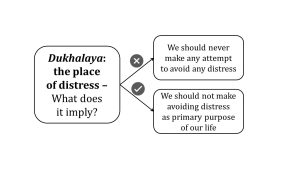We spend all of our lives reinforcing our separateness and our sense of a separate self… and from that planet of “Me,” all our suffering... all our stuff orbits. All day long, Me Me Me.
— Krishna Das
A
AGING WELL
- Sleep well and try to make it an uninterrupted sleep
- Avoid ultra-processed foods
- Drink enough water
- Avoid smoking and drugs, do not drink alcohol in excess
- Exercise at least 4 times a week
- Eat fruits and vegetables
- Take care of your posture, stretch your muscles and relax from time to time
- Avoid stressing about work
3 habits can change your life.
- One habit that will take care of your health, for example, sports, exercise, gym, etc.
- One habit that will take care of your financial needs, for example side hustling, blogging, etc.
- One habit that will make you learn new things, for example, reading, travelling, etc.
 When the Bhagavad-gita (08.15) deems the world a place of distress (dukhalaya), what does this imply for our efforts to combat distress in our life? To understand, consider a parallel: the Himalayas, which, as the name indicates, is a place of ice and consequently cold.
When the Bhagavad-gita (08.15) deems the world a place of distress (dukhalaya), what does this imply for our efforts to combat distress in our life? To understand, consider a parallel: the Himalayas, which, as the name indicates, is a place of ice and consequently cold.
Suppose we are in the Himalayas and are feeling cold. We will naturally make efforts to avoid the cold, but we won’t be able to always avoid it entirely. Whenever we can find specific causes for the cold we are experiencing, we can and should try to fix those causes. But sometimes such causes may not be fixable. At those times, we need to endure the cold as well as we can. To persevere thus, we need a purpose that is meaningful enough for us to make the cold bearable. For example, if we aspire to scale a lofty mountain peak, the resulting inspiration may empower us to bear the trek’s unavoidable difficulties.
Similarly, that the world is dukhalaya means that while we will naturally strive to avoid distress, we shouldn’t make avoiding distress our life’s defining purpose. Why not? Because despite our best efforts, problems will sneak in somehow or the other. If we define our progress or success solely by how well we can avoid problems, we will set ourselves up for frustration. Instead, we can focus on finding a purpose that is meaningful enough for us to make life’s inevitable problems bearable. Helping us all find such a purpose is the purpose of Gita wisdom.
One-sentence summary:
The world is a place of distress — this doesn’t mean that we never make any attempt to avoid any distress; it just means that we don’t make avoiding distress our life’s primary purpose.
A
A




No comments:
Post a Comment